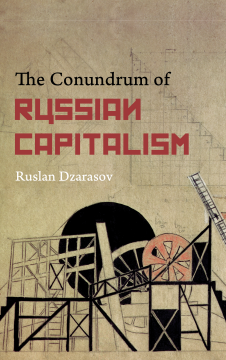
Additional Information
Book Details
Abstract
The fall of the Soviet Union and the emergence of contemporary Russian capitalism are often all too often read as a juncture with the past. In reality, Russia's current capitalist system originated in the degenerated Soviet bureaucracy, alongside the pressures of global capital.
From Roman Abramovich to Leonid Mikhelson, the reign of the CEO in Russia corporations mirrors the autocracy of the Soviet Union's leaders: the Russian tradition of the Cult of Personality lives on. The conception of the massive corporations, and the autocrats that lead them, occurred towards the end of the Soviet Union, when the would-be owners seized corporate assets and, taking advantage of Gorbachev's reforms, transformed publicly owned industry into private enterprises with themselves at the helm. By comparing the practices of Russian corporate governance, labour practices and investment strategies to the typical models of corporate governance and investment behaviour of big firms in the West, Ruslan Dzarasov exposes the parallels between the core and the periphery of the capitalist world-system.
Drawing on the theory of Leon Trotsky, as well as Immanuel Wallerstein and Robert Brenner, this study disrupts many of the myths about Russia's political economy.
'Takes a novel theoretical approach to understanding the corporate enterprise that will fundamentally change how heterodox economists will think them'
Professor Frederic S. Lee, editor of American Journal of Economics and Sociology
'An important contribution to understanding capitalism in Russia, more than 20 years after the break-up of the USSR'
Simon Pirani, Senior Research Fellow, Oxford Institute for Energy Studies
Table of Contents
| Section Title | Page | Action | Price |
|---|---|---|---|
| Cover | Cover | ||
| Contents | v | ||
| List of Figures | vi | ||
| List of Tables | viii | ||
| Acknowledgements | ix | ||
| Introduction | 1 | ||
| 1. Global Accumulation and the Capitalist World-sytem | 15 | ||
| 2. From Central Planning to Capitalism | 42 | ||
| 3. Russian Big Business: Corporate Governance and the Time Horizon | 80 | ||
| 4. Rent Withdrawal, Social Conflict and Accumulation | 133 | ||
| 5. Insider Rent and Conditions of Growth in the Russian Economy | 175 | ||
| 6. The Accumulation of Capital by Russian Corporations: Some Empirical Evidence | 196 | ||
| Conclusion | 255 | ||
| Notes | 261 | ||
| Bibliography | 269 | ||
| Index | 290 |
